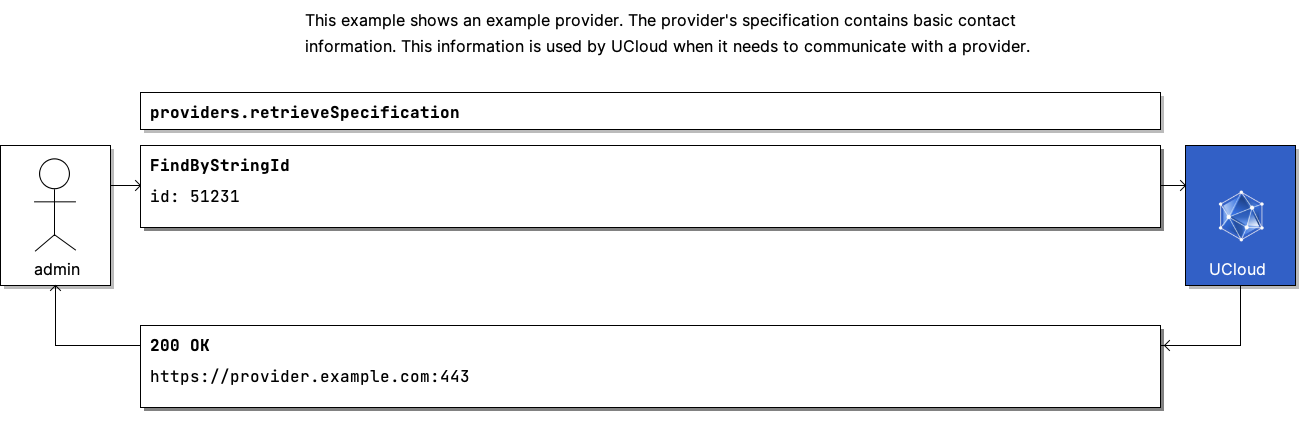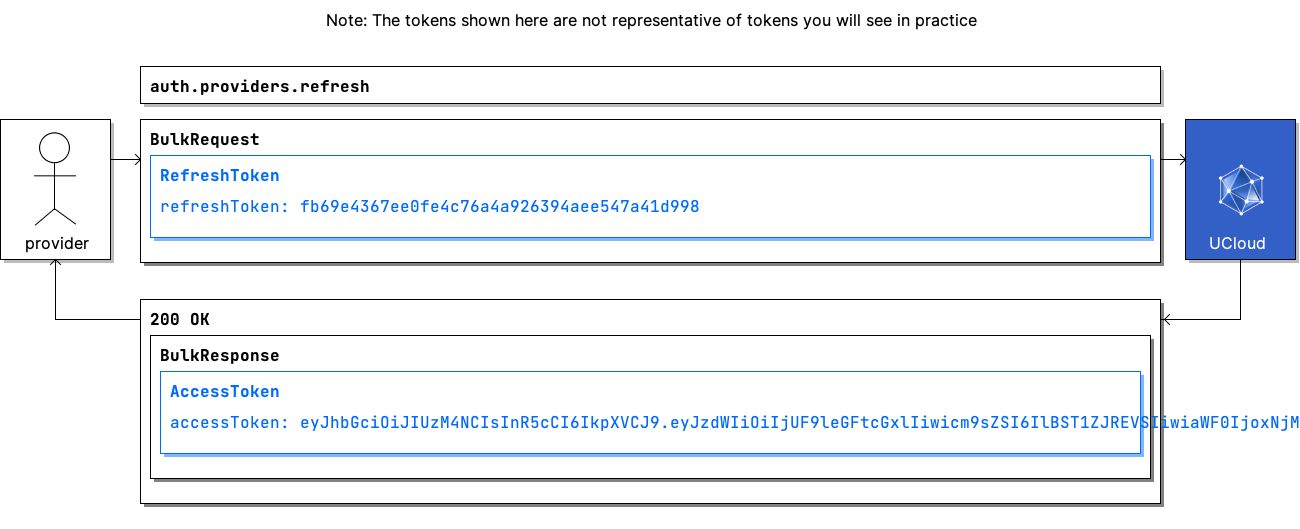Providers¶
Providers, the backbone of UCloud, expose resources, such as compute and storage, to end-users.
Rationale¶
UCloud/Core is an orchestrator of Resources. This means, that the core doesn’t actually know how
to serve files or run computational workloads. Instead, the core must ask one or more Providers
to fulfil requests from the user.

Figure: UCloud/Core receives a request from the user and forwards it to a provider.
The core isn’t a simple proxy. Before passing the request, UCloud performs the following tasks:
Authentication: UCloud ensures that users have authenticated.
Authorization: The
Projectsystem of UCloud brings role-based authorization to allResources. The core verifies all actions before forwarding the request.Resolving references: UCloud maintains a catalog of all
Resources in the system. All user requests only contain a reference to theseResources. UCloud verifies and resolves all references before proxying the request.
The communication between UCloud/Core and the provider happens through the provider APIs. Throughout the developer guide, you will find various sections describing these APIs. These APIs contain both an ingoing (from the provider’s perspective) and outgoing APIs. This allows for bidirectional communication between both parties. In almost all cases, the communication from the user goes through UCloud/Core. The only exception to this rule is when the data involved is either sensitive or large. In these cases, UCloud will only be responsible for facilitating direct communication. A common example of this is file uploads.
📝 NOTE: Communication between UCloud/Core and a service provider is in practice subject to various agreements according to applicable law and/or an organization’s policies. These are not described here as it is out-of-scope for the technical documentation.
Suggested Reading¶
Table of Contents¶
1. Examples
| Description |
|---|
| Definition of a Provider (Retrieval) |
| A Provider authenticating with UCloud/Core |
2. Remote Procedure Calls
| Name | Description |
|---|---|
browse |
Browses the catalog of available Providers |
retrieve |
Retrieves a single Provider |
retrieveSpecification |
Retrieves the specification of a Provider |
search |
Searches the catalog of available resources |
approve |
Used for the last step of the approval protocol |
create |
Creates one or more Providers |
init |
Request (potential) initialization of resources |
renewToken |
Replaces the current refresh-token and certificate of a Provider |
requestApproval |
Used for the approval protocol |
update |
Updates the specification of one or more providers |
updateAcl |
Updates the ACL attached to a resource |
3. Data Models
| Name | Description |
|---|---|
Provider |
Providers, the backbone of UCloud, expose compute and storage resources to end-users. |
ProviderIncludeFlags |
Flags used to tweak read queries |
ProviderSpecification |
The specification of a Provider contains basic (network) contact information |
ProviderStatus |
A placeholder document used only to conform with the Resources API |
ProviderSupport |
A placeholder document used only to conform with the Resources API |
ProviderUpdate |
Updates regarding a Provider, not currently in use |
ResourceOwner |
The owner of a `Resource` |
ResourcePermissions |
No description |
UpdatedAcl |
No description |
ProvidersApproveRequest |
Request type used as part of the approval process |
ProvidersRenewRefreshTokenRequestItem |
Request type for renewing the tokens of a Provider |
ProvidersRequestApprovalRequest |
Request type used as part of the approval process |
ProvidersRequestApprovalRequest.Information |
Request type used as part of the approval process, provides contact information |
ProvidersRequestApprovalRequest.Sign |
Request type used as part of the approval process, associates a UCloud user to previously uploaded information |
ProvidersRequestApprovalResponse |
Response type used as part of the approval process |
ProvidersRequestApprovalResponse.AwaitingAdministratorApproval |
Response type used as part of the approval process |
ProvidersRequestApprovalResponse.RequiresSignature |
Response type used as part of the approval process |
Example: Definition of a Provider (Retrieval)¶
| Frequency of use | Common |
|---|---|
| Actors |
|
Communication Flow: Kotlin
/* This example shows an example provider. The provider's specification contains basic contact
information. This information is used by UCloud when it needs to communicate with a provider. */
Providers.retrieveSpecification.call(
FindByStringId(
id = "51231",
),
admin
).orThrow()
/*
ProviderSpecification(
domain = "provider.example.com",
https = true,
id = "example",
port = 443,
product = ProductReference(
category = "",
id = "",
provider = "ucloud_core",
),
)
*/
Communication Flow: Curl
# ------------------------------------------------------------------------------------------------------
# $host is the UCloud instance to contact. Example: 'http://localhost:8080' or 'https://cloud.sdu.dk'
# $accessToken is a valid access-token issued by UCloud
# ------------------------------------------------------------------------------------------------------
# This example shows an example provider. The provider's specification contains basic contact
# information. This information is used by UCloud when it needs to communicate with a provider.
# Authenticated as admin
curl -XGET -H "Authorization: Bearer $accessToken" "$host/api/providers/retrieveSpecification?id=51231"
# {
# "id": "example",
# "domain": "provider.example.com",
# "https": true,
# "port": 443,
# "product": {
# "id": "",
# "category": "",
# "provider": "ucloud_core"
# }
# }
Communication Flow: Visual

Example: A Provider authenticating with UCloud/Core¶
| Frequency of use | Common |
|---|---|
| Pre-conditions |
|
| Actors |
|
Communication Flow: Kotlin
/* 📝 Note: The tokens shown here are not representative of tokens you will see in practice */
AuthProviders.refresh.call(
bulkRequestOf(RefreshToken(
refreshToken = "fb69e4367ee0fe4c76a4a926394aee547a41d998",
)),
provider
).orThrow()
/*
BulkResponse(
responses = listOf(AccessToken(
accessToken = "eyJhbGciOiJIUzM4NCIsInR5cCI6IkpXVCJ9.eyJzdWIiOiIjUF9leGFtcGxlIiwicm9sZSI6IlBST1ZJREVSIiwiaWF0IjoxNjMzNTIxMDA5LCJleHAiOjE2MzM1MjE5MTl9.P4zL-LBeahsga4eH0GqKpBmPf-Sa7pU70QhiXB1BchBe0DE9zuJ_6fws9cs9NOIo",
)),
)
*/
Communication Flow: Curl
# ------------------------------------------------------------------------------------------------------
# $host is the UCloud instance to contact. Example: 'http://localhost:8080' or 'https://cloud.sdu.dk'
# $accessToken is a valid access-token issued by UCloud
# ------------------------------------------------------------------------------------------------------
# 📝 Note: The tokens shown here are not representative of tokens you will see in practice
# Authenticated as provider
curl -XPOST -H "Authorization: Bearer $accessToken" -H "Content-Type: content-type: application/json; charset=utf-8" "$host/auth/providers/refresh" -d '{
"items": [
{
"refreshToken": "fb69e4367ee0fe4c76a4a926394aee547a41d998"
}
]
}'
# {
# "responses": [
# {
# "accessToken": "eyJhbGciOiJIUzM4NCIsInR5cCI6IkpXVCJ9.eyJzdWIiOiIjUF9leGFtcGxlIiwicm9sZSI6IlBST1ZJREVSIiwiaWF0IjoxNjMzNTIxMDA5LCJleHAiOjE2MzM1MjE5MTl9.P4zL-LBeahsga4eH0GqKpBmPf-Sa7pU70QhiXB1BchBe0DE9zuJ_6fws9cs9NOIo"
# }
# ]
# }
Communication Flow: Visual

Remote Procedure Calls¶
browse¶
Browses the catalog of available Providers
| Request | Response | Error |
|---|---|---|
ResourceBrowseRequest<ProviderIncludeFlags> |
PageV2<Provider> |
CommonErrorMessage |
This endpoint can only be used my users who either own a Provider or are a UCloud administrator.
retrieve¶
Retrieves a single Provider
| Request | Response | Error |
|---|---|---|
ResourceRetrieveRequest<ProviderIncludeFlags> |
Provider |
CommonErrorMessage |
This endpoint can only be used my users who either own a Provider or are a UCloud administrator.
retrieveSpecification¶
Retrieves the specification of a Provider
| Request | Response | Error |
|---|---|---|
FindByStringId |
ProviderSpecification |
CommonErrorMessage |
This endpoint is used by internal services to look up the contact information of a Provider
search¶
Searches the catalog of available resources
| Request | Response | Error |
|---|---|---|
ResourceSearchRequest<ProviderIncludeFlags> |
PageV2<Provider> |
CommonErrorMessage |
approve¶
Used for the last step of the approval protocol
| Request | Response | Error |
|---|---|---|
ProvidersApproveRequest |
FindByStringId |
CommonErrorMessage |
This call is used as part of the approval protocol. View the example for more information.
Examples:
| Example |
|---|
| Registration protocol |
create¶
Creates one or more Providers
| Request | Response | Error |
|---|---|---|
BulkRequest<ProviderSpecification> |
BulkResponse<FindByStringId> |
CommonErrorMessage |
This endpoint can only be invoked by a UCloud administrator.
init¶
Request (potential) initialization of resources
| Request | Response | Error |
|---|---|---|
Unit |
Unit |
CommonErrorMessage |
This request is sent by the client, if the client believes that initialization of resources might be needed. NOTE: This request might be sent even if initialization has already taken place. UCloud/Core does not check if initialization has already taken place, it simply validates the request.
renewToken¶
Replaces the current refresh-token and certificate of a Provider
| Request | Response | Error |
|---|---|---|
BulkRequest<ProvidersRenewRefreshTokenRequestItem> |
Unit |
CommonErrorMessage |
⚠️ WARNING: This endpoint will immediately invalidate all traffic going to your Provider
This endpoint should only be used if the current tokens are compromised.
requestApproval¶
Used for the approval protocol
| Request | Response | Error |
|---|---|---|
ProvidersRequestApprovalRequest |
ProvidersRequestApprovalResponse |
CommonErrorMessage |
This call is used as part of the approval protocol. View the example for more information.
Examples:
| Example |
|---|
| Registration protocol |
update¶
Updates the specification of one or more providers
| Request | Response | Error |
|---|---|---|
BulkRequest<ProviderSpecification> |
BulkResponse<FindByStringId> |
CommonErrorMessage |
This endpoint can only be invoked by a UCloud administrator.
updateAcl¶
Updates the ACL attached to a resource
| Request | Response | Error |
|---|---|---|
BulkRequest<UpdatedAcl> |
BulkResponse<Unit> |
CommonErrorMessage |
Data Models¶
Provider¶
Providers, the backbone of UCloud, expose compute and storage resources to end-users.
data class Provider(
val id: String,
val specification: ProviderSpecification,
val refreshToken: String,
val publicKey: String,
val createdAt: Long,
val status: ProviderStatus,
val updates: List<ProviderUpdate>,
val owner: ResourceOwner,
val permissions: ResourcePermissions?,
val providerGeneratedId: String?,
)
You can read more about providers here.
Properties
id: String
StringThe ID is unique across a provider for a single resource type.
specification: ProviderSpecification
ProviderSpecification
refreshToken: String
String
publicKey: String
String
createdAt: Long
Long
status: ProviderStatus
ProviderStatus
updates: List<ProviderUpdate>
List<ProviderUpdate>Updates provide a way for both UCloud, and the provider to communicate to the user what is happening with their resource.
owner: ResourceOwner
ResourceOwner
permissions: ResourcePermissions?
ResourcePermissions?A null value indicates that permissions are not supported by this resource type.
providerGeneratedId: String?
String?ProviderIncludeFlags¶
Flags used to tweak read queries
data class ProviderIncludeFlags(
val includeOthers: Boolean?,
val includeUpdates: Boolean?,
val includeSupport: Boolean?,
val includeProduct: Boolean?,
val filterCreatedBy: String?,
val filterCreatedAfter: Long?,
val filterCreatedBefore: Long?,
val filterProvider: String?,
val filterProductId: String?,
val filterProductCategory: String?,
val filterProviderIds: String?,
val filterIds: String?,
val filterName: String?,
val hideProductId: String?,
val hideProductCategory: String?,
val hideProvider: String?,
)
Properties
includeOthers: Boolean?
Boolean?
includeUpdates: Boolean?
Boolean?
includeSupport: Boolean?
Boolean?
includeProduct: Boolean?
Boolean?
filterCreatedBy: String?
String?
filterCreatedAfter: Long?
Long?
filterCreatedBefore: Long?
Long?
filterProvider: String?
String?
filterProductId: String?
String?
filterProductCategory: String?
String?
filterProviderIds: String?
String?
filterIds: String?
String?
filterName: String?
String?
hideProductId: String?
String?
hideProductCategory: String?
String?
hideProvider: String?
String?ProviderSpecification¶
The specification of a Provider contains basic (network) contact information
data class ProviderSpecification(
val id: String,
val domain: String,
val https: Boolean,
val port: Int?,
val product: ProductReference,
)
ProviderStatus¶
A placeholder document used only to conform with the Resources API
data class ProviderStatus(
val resolvedSupport: ResolvedSupport<Product, ProviderSupport>?,
val resolvedProduct: Product?,
)
Properties
resolvedSupport: ResolvedSupport<Product, ProviderSupport>?
ResolvedSupport<Product, ProviderSupport>?
resolvedProduct: Product?
Product?ProviderSupport¶
A placeholder document used only to conform with the Resources API
data class ProviderSupport(
val product: ProductReference,
val maintenance: Maintenance?,
)
ProviderUpdate¶
Updates regarding a Provider, not currently in use
data class ProviderUpdate(
val timestamp: Long,
val status: String?,
)
ResourceOwner¶
The owner of a Resource
data class ResourceOwner(
val createdBy: String,
val project: String?,
)
ResourcePermissions¶
data class ResourcePermissions(
val myself: List<Permission>,
val others: List<ResourceAclEntry>?,
)
Properties
myself: List<Permission>
List<Permission>
others: List<ResourceAclEntry>?
List<ResourceAclEntry>?This value typically needs to be included through the includeFullPermissions flag
UpdatedAcl¶
data class UpdatedAcl(
val id: String,
val added: List<ResourceAclEntry>,
val deleted: List<AclEntity>,
)
ProvidersApproveRequest¶
Request type used as part of the approval process
data class ProvidersApproveRequest(
val token: String,
)
Properties
token: String
StringProvidersRenewRefreshTokenRequestItem¶
Request type for renewing the tokens of a Provider
data class ProvidersRenewRefreshTokenRequestItem(
val id: String,
)
Properties
id: String
StringProvidersRequestApprovalRequest¶
Request type used as part of the approval process
sealed class ProvidersRequestApprovalRequest {
class Information : ProvidersRequestApprovalRequest()
class Sign : ProvidersRequestApprovalRequest()
}
ProvidersRequestApprovalRequest.Information¶
Request type used as part of the approval process, provides contact information
data class Information(
val specification: ProviderSpecification,
val type: String /* "information" */,
)
Properties
specification: ProviderSpecification
ProviderSpecification
type: String /* "information" */
String /* "information" */ProvidersRequestApprovalRequest.Sign¶
Request type used as part of the approval process, associates a UCloud user to previously uploaded information
data class Sign(
val token: String,
val type: String /* "sign" */,
)
ProvidersRequestApprovalResponse¶
Response type used as part of the approval process
sealed class ProvidersRequestApprovalResponse {
class AwaitingAdministratorApproval : ProvidersRequestApprovalResponse()
class RequiresSignature : ProvidersRequestApprovalResponse()
}
ProvidersRequestApprovalResponse.AwaitingAdministratorApproval¶
Response type used as part of the approval process
data class AwaitingAdministratorApproval(
val token: String,
val type: String /* "awaiting_admin_approval" */,
)
ProvidersRequestApprovalResponse.RequiresSignature¶
Response type used as part of the approval process
data class RequiresSignature(
val token: String,
val type: String /* "requires_signature" */,
)





